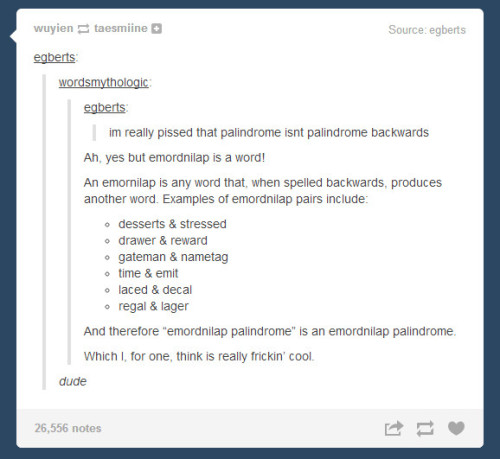EMORDNILAP
This recently invented word appropriately sounds like a word being spoken backwards when said out loud. It describes words that make other words when spelt backwards. Unlike palindromes which are the same word when spelt backwards or forwards. The emordnilap spells another word when spelt backwards. Diaper becomes repaid and stressed appropriately becomes desserts.
New words are regularly brought into the language. Shakespeare was responsible for introducing over 1700 words in his time. Hashtag and selfie are part of the global lexicon now, but were unheard of twenty years ago. Usage is the hallmark that gets a word recognized and eventually included in dictionaries.
Emordnilap has just as much reason to be formally included in the everyday lexicon as any other word. Ironically, the topic for which it is used seems to preclude it being used often enough to be included in dictionaries. It is doubtful that the phrase “I saw a great emordnilap today” has been spoken outside a very small circle of logomaniacs. Marketers will find unique alliteration opportunities for the quirky emordnilap and some rappers use them instinctively.
Emordnilap certainly isn’t one of those words that drip like honey from the tongue. The triple consonant phoneme in the middle sounds clumsy and stumbles from a confused tongue. The vowels also sound wrong in that order. However, being an ugly word doesn’t mean it isn’t a word. It describes a legitimate peculiarity of language and deserves its place in the lexicon because of that.
Words that have regular usage and become common are eventually included in dictionaries. Emordnilap may never have that honour as it will never be used often enough to be considered a common word. If that is the case though, then it is surprising any scientific type word makes it into a dictionary.
In defence of the emordnilap, it is no less common than onomatopoeia which is right there in the Os. Or any other rarely used word for that matter. The dictionary jury will stay out a while longer on this it seems. If a phenomenon exists, it surely needs a word to describe it. Clear communication demands it. Although, if we are going to be making up words, perhaps just make them better sounding and easier to pronounce.

SOMETHING ABOUT PALINDROMES
Palindromes are a quirk of language where a word is read the same forwards or backwards. Madam, level and civic are everyday examples of palindromes. Not only words but complete sentences, numbers or in fact any string of characters can be palindromes.
Sentences that are palindromes aren’t usually entirely useful but are curious nonetheless. “Nate bit a Tibetan” may be useful if you know a Nate and he happens to have bitten a Tibetan. “No lemon, no melon” will come in handy if you are a grocer and have actually run out of melons and lemons. Witty vegans would have good cause to say “Ew! Eat a ewe?” However, “God! A red nugget! A fat egg under a dog!” would require some unique circumstances to be exclaimed out loud!
Numbers as palindromes happen as dates every 110 years. 2002 most recently with the next being 2112. In between these milestone centuries, calendar dates can also be palindromes. Using the dd-mm-yy format, 6-10-2016 reads the same both ways as will 02-02-2020. Yet dates as palindromes are rare. It would be easy to build superstitions around such auspicious rarities.
There can be palindromic images or ambigrams as well. These entertaining wonders are images that are the same upside down as right side up. The spelling of the word is usually not a palindrome, however. The font is usually artistically manipulated to trick the eye into reading one letter as another. The author and artist Clive Barker uses this to good effect on the dust jacket covers of the Abarat series of books.


